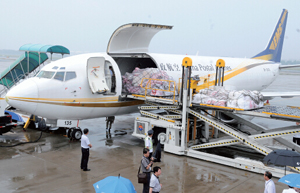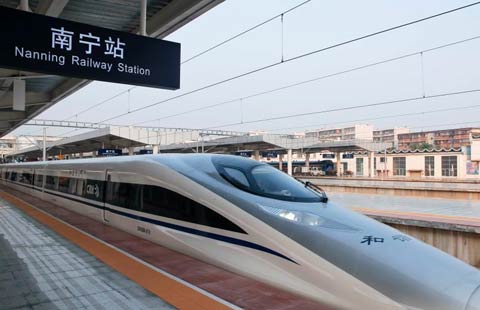China streamlines customs for e-shopping overseas
(Xinhua) Updated: 2014-09-26 10:06GUANGZHOU - Foreigners look out: a huge wave of Chinese netizens is approaching for your bargains!
Chinese buyers have long been known for splurging in overseas shops, but it is becoming more and more common for the country's Internet users to snap up foreign goods with a few mouse clicks.
Thus, reforms are needed. On Wednesday, customs in South China's Guangzhou city launched a new direct purchase model that smoothes customs procedures for overseas purchases in the country's latest effort to promote foreign trade through e-commerce.
The new initiative allows e-commerce companies to simultaneously register overseas orders with customs, so tariff collection and other procedures can be sped up as the goods go through clearing.
It also promises no tariffs except for tax levied on imported parcels.
Compared with overseas purchases via transfer companies or domestic agents, the new model promises quicker delivery and less hassle for Chinese consumers. For e-commerce operators and the global market, it smells of business boon.
"It will bring new opportunities to Chinese cross-border e-commerce companies and also boost China's imports," said Luo Shuang with Vip.com, a Chinese discount retailer. On Wednesday, the company finished customs procedures for 800 watches in just 40 minutes.
Though buying from overseas is popular in China, the practice is beset by irregularities and legal problems, and the trade has long wished for a more transparent and regulated transaction model, Luo told Xinhua.
"After the grey areas are cleared, Chinese consumers' satisfaction with cross-border online shopping will see a significant rise, and so will their demand for global brands and quality goods," she said.
Shopping online, and overseas
China's e-commerce sector has attracted global attention for its sheer size and huge potential. Its online retail volume increased by 41 percent year on year to 1.85 trillion yuan ($301.5 billion) in 2013, making China the world's largest e-retailing market, according to the Ministry of Commerce.
In August, Amazon announced plans to open a cross-border e-commerce service in China to connect Chinese shoppers to its global sales network.
The move targets Chinese consumers' hunger for foreign goods that are unavailable or exorbitantly priced in China, as well as their complaints of difficulties in such transactions. Consumers who place orders on Amazon and eBay must wait weeks for parcels to arrive. Some resort to China-based agents for faster delivery but worry about their goods' authenticity and difficult access to after-sale service.
The new customs model is part of broader customs reform in China to promote foreign trade. In May, the State Council issued a guideline that promised measures to facilitate cross-border e-commerce transactions.
China last year also allowed e-commerce companies to import goods via the country's bonded areas to reduce tax. The new direct purchase model boasts more categories for consumers to select without having to import and stockpile them in bonded areas first.
"From last year's bonded area imports to direct purchase imports, it's clear that China is using cross-border e-commerce as an important tool to boost foreign trade and adjust the economic structure," said Lai Shujia, vice head of Guangzhou customs.
|
 |
 |
| Express delivery sector opens up | Service gets more attention in online shopping |
- China, Spain to ink $4b deals
- China's slower GDP growth worthwhile for long-term sustainability
- China's fund industry association signs MoU with British peer
- High-speed train from Nanning to Beijing starts operation
- Tech firm basks in Intel glory
- Who will buy into the next big thing?
- Net foreign exchange sales 'no problem'
- Youth power fueling China's vehicle sales

















